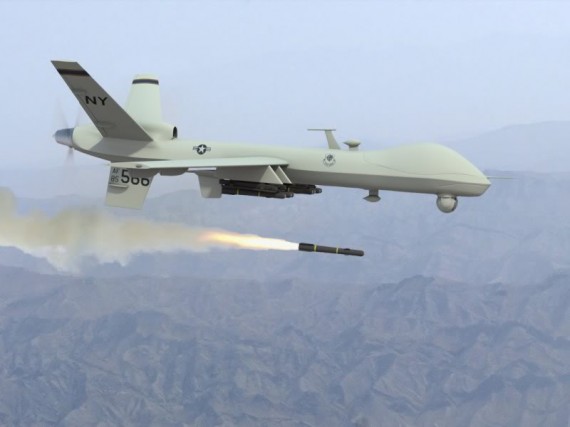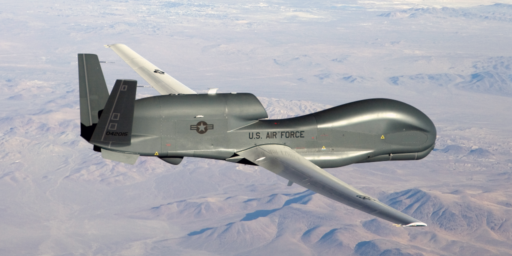U.S. Drones Strike Somalia, Or As We Can Now Call It, “War Number Five”
Today’s Washington Post reports that American drones have made strikes against “militants” in Somalia:
A U.S. drone aircraft fired on two leaders of a militant Somali organization tied to al-Qaeda, apparently wounding them, a senior U.S. military official familiar with the operation said Wednesday.
The strike last week against senior members of al-Shabab comes amid growing concern within the U.S. government that some leaders of the Islamist group are collaborating more closely with al-Qaeda to strike targets beyond Somalia, the military official said.
The airstrike makes Somalia at least the sixth country where the United States is using drone aircraft to conduct lethal attacks, joining Afghanistan, Pakistan, Libya, Iraq and Yemen. And it comes as the CIA is expected to begin flying armed drones over Yemen in its hunt for al-Qaeda operatives.
Al-Shabab has battled Somalia’s tenuous government for several years. In recent months, U.S. officials have picked up intelligence that senior members of the group have expanded their ambitions beyond attacks in Somalia.
“They have become somewhat emboldened of late, and, as a result, we have become more focused on inhibiting their activities,” the official said.”They were planning operations outside of Somalia.”
Both of the al-Shabab leaders targeted in the attack had “direct ties” to American-born cleric Anwar al-Aulaqi, the military official said. Aulaqi escaped a U.S. drone strike in Yemen in May.
The White House declined Wednesday night to respond to questions about the attack.
But Obama administration officials have made repeated references to al-Shabab in recent weeks, indicating that the group has expanded its aims and its operations. In a speech Wednesday unveiling the administration’s new counterterrorism strategy, senior White House aide John O. Brennan included Somalia among the countries where the administration has placed a new focus on al-Qaeda affiliates.
“As the al-Qaeda core has weakened under our unyielding pressure, it has looked increasingly to these other groups and individuals to take up its cause, including its goal of striking the United States,” said Brennan, Obama’s chief counterterrorism adviser. “From the territory it controls in Somalia,” he said, “al-Shabab continues to call for strikes against the United States.”
All of this is perfectly legal, of course, thanks to the broad, open-ended, unlimited in scope, time, or place Authorization For The Use Of Military Force that Congress passed in October 2001. While it’s certainly advisable that the President have discretion in going after al-Qaeda and its associates, one does wonder if it isn’t about time for Congress to review that AUMF and examine whether some limits need to be placed on it. At this point, it can be used to justify virtually any action anywhere in the world as long as the President says he’s going after al-Qaeda. That just doesn’t seem right to me.






lets just call it the war on terror and be done with it.
I suggested a few days ago this was part of the reason Mr. Obama chose not to seek authorization — because we have more of these things going on than we are publicly acknowledging. But calling it a war is stretching the term beyond usefulness. This is something new, a new reality and we need to define it and figure out how to manage oversight.
Personally, anytime we blow up an Al Qaeda operative, I’m happy.
@michael reynolds: I think in terms of the War Powers Act, all these things are “wars.” In terms of the way we normally think about these things, though, you’re quite right: Blowing things up from the sky with no danger to American forces isn’t really a “war.”
And, yeah, I’m in fan of killing al Qaeda whenever, wherever. Which, oddly, was what I thought the Bush policy after 9/11 was going to be: An actual war on terror without any lingering nation-building. Just blow up the bad guys and go home.
You don’t see a serious double standard with this? If they kill some of us, we say it’s war. If we kill them with no risk to ourselves, it isn’t. This seems nothing so much as a method for presidents to circumvent constitutional limitations on war-making, not that congress has done much to enforce those limitations.
In all seriousness, are we going to claim that zero american casualties means we aren’t engaged in hostilities? Is this true when we kill a hundred enemies? Does it continue to be true if we’ve killed a thousand? At what point do we objectively say we are at war, or do we leave that determination up to the president?
If we go along with this we effectively give the president dictatorial powers in the military sphere; this is not what was intended by the framers of the Constitution, so we really need to do some soul-searching as a nation here and decide whether we no longer see the wisdom of the Founders as relevant to the modern world.
Shooting missiles at another country isn’t an act of war? So if Somalia or say Mexico or Canada shot missiles into the US it would be seen as just a different kind of peaceful negotiation?
Is it not a war because just the other side’s people are being killed, and only becomes a war if our people are getting killed as well?
I’d argue that by common usage, bombing another country is being at war, declared or not. If there’s a reason for us to be doing so, then fine, declare it a war, fund it by raising taxes, and justify it to the people. If the gov’t (either Republican or Democratic) can’t justify it to the people, then don’t do it.
Ben:
The problem is that “war” is a term we used for a long time to mean a certain thing. We sent men and weapons off to some enemy state and killed some people in pursuit of a political objective. That’s been war since Babylon.
Our enemies now are not ancient city-states or modern nation-states. In many cases they are small groups operating within failed states like Somalia. We can’t declare war on Somalia, it’s absurd, when all we really want to do is kill a dozen people in some remote Somali village. And I suspect Somalis would much rather we handled things that way than invade their country and occupy it.
So we have here a new thing. It doesn’t quite fit the word “war” because we aren’t sending a bunch of guys and weapons off to some enemy state. We’re sending robots off, and the state in question — the nation — is purely incidental to the matter.
Were we dealing with France we’d demand they hunt down and turn over the terrorists. But it’s Somalia and Yemen and Pakistan where such demands are unlikely to yield results.
@Michael
The problem is I have only the President’s assurrance that there is good reason for military intervention in Somalia. You’re an intelligent man; I know you can see the potential for misuse of such powers. Would you trust a President Bachmann to control those drones and deploy them for the right reasons, or is it possible she and the brain-dead Jesus humpers she’ll surround herself with will be smiting the unbelievers?
And what happens when the U.S. is no longer completely dominant in military affairs? When another country lobs a few missiles into California to deal with “terrorists” they believe the American government is “sheltering”? Sooner or later this is exactly what will happen, and we will have set the stage for it.
I understand that limiting the powers of the executive carries some measure of risk, but we’ve seen over and over again during the last decade that expansion of a president’s authority leads to calls for further expansion. I have yet to see a point where this pattern will end.
Ben:
Don’t get me wrong, I’ve been pretty consistent in saying we need oversight. How exactly? I don’t know. I think this is different from a war, closer in a way to the old-style “wet work” done by intelligence agencies. I think there are times when we want deniability or at least a sort of discreet silence. Maybe this should go through the intel committees using that process.